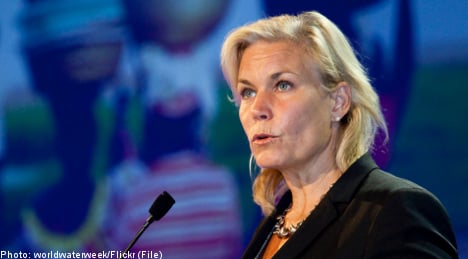Sweden’s ambassadors to Bolivia, Colombia and Guatemala have filed complaints with the Foreign Ministry, warning that cutting Sweden’s half-billion-kronor ($77 million) budget for aid to Latin America will have “devastating consequences”.
“The Latin American countries are not at all as poor as the countries I focus on in Africa and we do not have endless money and resources,” Carlsson told Sveriges Radio (SR).
She argued that governments in Latin American countries have access to resources and need to take responsibility for their own development.
Speaking to The Local, Annica Sohlström, director of Forum Syd – an umbrella network of 163 Swedish NGOs – called the decision to cut aid to Latin America “unfortunate”.
“Today, 75 percent of poor people live in middle-income countries, so this argument that aid should go to the poorest countries doesn’t hold up. It is the world’s poorest, no matter where they live, whom we should be helping.”
Sohlström also criticized Carlsson’s recent announcement that aid to the Palestinian territories may be slashed.
“It is unfortunate that the Palestinian people should be punished for the ongoing conflict with Israel,” she said.
Sohlström added that Swedish aid organizations work with supporting democratic processes and suggested that assistance is needed with this work in the Palestinian territories.
Carlsson also received criticism from within the Alliance government. The Centre Party’s aid policy spokeswoman Kerstin Lundgren told SR she was surprised by Carlsson’s recent announcement, saying the government is dedicated to continuing assisting the Palestinians with state-building.
Writing in newspaper Dagens Nyheter (DN) Tuesday, representatives of three Swedish aid organizations criticized Carlsson and the government for a lack of transparency in formulating the Swedish aid platform and argued that too much aid money ends up staying in Sweden.
A total of 13.5 percent of the aid budget is used to finance migration-related costs. That is a fourfold increase over the past seven years.
The directors of the Swedish Mission Council (SMC, Svenska missionsrådet), the Swedish Pentecostal Churches (PMU, Pingst¬missionens Utvecklingssamarbete) and Diakonia claimed that, in the aid budget, every seventh Swedish krona stays in Sweden.
“Sweden should have a generous refugee policy, but to finance the Swedish Migration Council [Migrationsverket] with aid money aimed at poor countries is not reasonable,” they argued.
Sohlström told The Local: “We believe Swedish aid is being hollowed out. A country like Sweden should be able to afford receiving refugees but at the same time that should not happen at the cost of the poor people whom aid money is meant for.”
In April, Carlsson said that the government would change the way it determines Sweden’s aid policy. Speaking to SR, she said the government would formulate the aid policy platform internally first and then publish it online to have a continued debate with other actors.
In their DN article, the three aid organization representatives said this signals a lack of “transparency”.
Regarding aid to Latin America, Carlsson has said that the issue will be determined in the fall budget.
“Sweden cannot do everything everywhere. Are we helping poor and unfree people every day? That is the question I have to ask myself,” she said.
The Local/nr



 Please whitelist us to continue reading.
Please whitelist us to continue reading.
Member comments